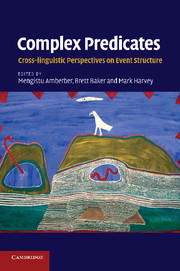Book contents
- Frontmatter
- Contents
- List of figures and tables
- List of contributors
- Preface
- 1 Introduction: complex predicates
- 2 Complex predicate formation
- 3 The light verb jungle: still hacking away
- 4 Events and serial verb constructions
- 5 Cotemporal serial verb constructions in White Hmong
- 6 Activity incorporates in some Athabaskan languages
- 7 Warlpiri verbs of change and causation: the thematic core
- 8 Complex predicates in Wambaya: detaching predicate composition from syntactic structure
- 9 Compound verbs and ideophones in Wolaitta revisited
- 10 The structure of the light verb construction in Amharic
- Index
7 - Warlpiri verbs of change and causation: the thematic core
Published online by Cambridge University Press: 07 May 2010
- Frontmatter
- Contents
- List of figures and tables
- List of contributors
- Preface
- 1 Introduction: complex predicates
- 2 Complex predicate formation
- 3 The light verb jungle: still hacking away
- 4 Events and serial verb constructions
- 5 Cotemporal serial verb constructions in White Hmong
- 6 Activity incorporates in some Athabaskan languages
- 7 Warlpiri verbs of change and causation: the thematic core
- 8 Complex predicates in Wambaya: detaching predicate composition from syntactic structure
- 9 Compound verbs and ideophones in Wolaitta revisited
- 10 The structure of the light verb construction in Amharic
- Index
Summary
Introduction
The morphosyntactic, semantic, and phonological properties of Warlpiri verbs have been investigated by a number of scholars including Hale (1982, 1983), Hale, Laughren, and Simpson (1995), Harvey and Baker (2005), Laughren (1988, 1992), Legate (2002, 2003, 2008), Levin (1983), Nash (1982, 1986), Reimer (2002, 2003, 2008), and Simpson (1991, 2002). This study will focus on that part of the verbal complex which I will refer to as the ‘thematic core’. It minimally consists of a thematic verb (V) which may be augmented by a non-inflecting preverbal (PV) element of a class which, following Nash 1982, I will refer to as ‘lexical’: [(PV lexical])=V], or by PVs derived from other phrasal categories. I will argue that the thematic core of the larger verbal constituent ‘maps onto’ an event structure which represents its predicate argument structure (PAS) and its Aktionsart properties. This study investigates the relationship between the PV and V forms which instantiate the thematic core, from the perspective of their individual and combined contribution to the underlying event structure. It also compares the event structure of ‘heavy verbs’ (HV) with their ‘light verb’ (LV) homophones, and also with synonymous PV-LV complex verbs.
- Type
- Chapter
- Information
- Complex PredicatesCross-linguistic Perspectives on Event Structure, pp. 167 - 236Publisher: Cambridge University PressPrint publication year: 2010
- 10
- Cited by



